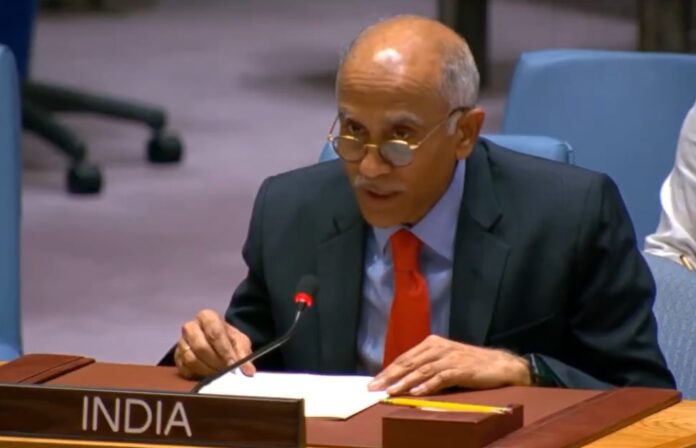India strongly defended its recent counterterrorism operation, codenamed Operation Sindoor, during a United Nations Security Council (UNSC) debate on Tuesday. Citing the Council’s unanimous April 25 statement calling for the accountability of perpetrators, organisers, financiers, and sponsors of the Pahalgam attack, India’s Permanent Representative to the UN, P. Harish, stated that New Delhi’s action was both justified and necessary.
Harish told the Council that the strikes on terrorist camps in Pakistan and Pakistan-occupied Kashmir (PoK) were “focused, measured, and non-escalatory in nature.” He stressed that the operation was conducted within the bounds of international expectations, particularly in light of the April UNSC declaration, which emphasized holding those responsible for terrorism accountable.
“There must be a serious cost for those who continue to abet cross-border terrorism,” Harish asserted, underlining India’s long-standing concerns over Pakistan’s support to extremist groups operating across the border.
Warning about the evolving face of international conflict, Harish said that non-state actors are increasingly being propped up by state actors to wage proxy wars. He highlighted the use of cross-border funding, arms trafficking, digital communication technologies, and radical ideologies to fuel terrorism. “The nature of conflicts has transformed,” he said, noting that such threats now require multilateral and cohesive responses from the global community.
The discussion came during an open debate convened by Pakistan, which holds the rotating presidency of the Security Council this month. Titled “Multilateralism and Peaceful Settlement of Disputes,” the debate was seen by India as an indirect attempt by Islamabad to internationalize the Kashmir issue.
During the session, Pakistan’s Deputy Prime Minister Mohammad Ishaq Dar raised the Kashmir dispute and accused India of suspending the Indus Water Treaty. He criticized what he called the selective application of Security Council resolutions, which, he claimed, had eroded the credibility of the UN’s conflict-resolution mechanisms.
However, India pushed back firmly. Harish reminded the Council that UN Resolution 47, often cited by Pakistan, first calls for the withdrawal of Pakistani troops and cessation of support to armed groups. He also reiterated that any peaceful resolution must come from the parties directly involved, as outlined in Chapter VI of the UN Charter.
“National ownership and consent of parties are central to any efforts to achieve peaceful resolution of conflicts,” Harish said, rejecting third-party mediation in the Kashmir dispute.
He concluded his remarks by calling for urgent reforms in the Security Council itself, noting growing global dissatisfaction with its current structure and functioning. “The serious question marks over the representativeness of the UN Security Council must be addressed urgently,” he said.
Highlighting India’s role in fostering inclusivity, Harish noted that under its G20 presidency, India facilitated the African Union’s inclusion in the group—an example of efforts to ensure broader global representation.





